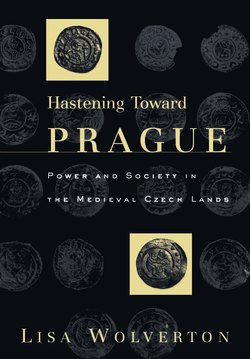Hastening Toward Prague

Реклама. ООО «ЛитРес», ИНН: 7719571260.
Оглавление
Lisa Wolverton. Hastening Toward Prague
Отрывок из книги
HASTENING TOWARD PRAGUE
Ruth Mazo Karras, Series Editor
.....
How these men were installed, and how tenuous and dependent their position, is best illustrated by the assorted references in the chronicles to castellans deposed, or worse, by the duke. Soběslav II, for instance, in revenge for the many years he spent in prison at Přimda, in 1174 captured its castellan and executed him publicly, in spite of his promise of grace and security.111 But the removal of castellans was not necessarily accompanied by their violent deaths: it could be as simple as a whisper in the ear. According to Cosmas, soon after Vratislav’s accession to the throne, Mstiš, the castellan of Bílina invited him to a church dedication there, although surely aware that the new duke harbored ill-will against him for the mistreatment of his first wife while imprisoned at Lštění some years before, under Mstiš’s care.112 Vratislav agreed to attend, saying “I will come, I will make my city joyful, and I will do what the affair and justice demand.”113 The duke apparently felt that justice called for the public disgrace and deposition of Mstiš at his own party: “While feasting, a messenger came who said in the ear of the comes: ‘The castellany of the city is withdrawn from you and given to Kojata, son of Všebor,’ who was at that time first in the ducal palace. To this the comes answered: ‘The duke is also the lord; let him do with his castle what he pleases.’”114 This story, whatever its basis in fact, demonstrates well the duke’s undisputed control of both castles and castellans. Still another remark by Cosmas is telling: After the assassination of Duke Svatopluk in 1109, when it was still undetermined whether Bořivoj or Vladislav would succeed, Fabian, castellan of Vyšehrad and undoubtedly among the most prominent magnates, “having left his city of Vyšehrad, tarried in villages in its neighborhood, dependent upon the uncertainty of fate.”115 Nothing in the sources suggests that appointments as castellan were ever more than temporary, or expected to be. The witness lists to charters of the late twelfth century provide an equally vivid, and more reliable, picture of the rotation of magnates in and out of castellanies and court offices; because of the profound effect this arrangement had upon the structure of the medieval Czech nobility, these documents will be treated in detail in the next chapter.
For our purposes here, it suffices to note the success and significance of the duke’s dominion over castles, large and small, and over the men who administered them—an argument that may also be made compellingly from negative evidence. In the many revolts and occasional battles against invaders from outside, none of the decisive confrontations centered on castles. In fact, virtually all of the military engagements described by chroniclers were waged in open terrain. The chief and most notable exception is Prague itself, which, as the emblem of the duke’s authority and site of his throne—the object of every pretender’s ambition—was frequently besieged.116 Likewise only the castles on both sides of the Austro-Moravian border functioned as bases from which to launch or wait out raids.117 Although Soběslav II successfully holed up in a castle, remaining at Skála for the better part of 1179 after Frederick managed to oust him from the throne, on no other occasion was a magnate or any other Přemyslid able to do so, whether seeking to establish an independent lordship or simply to avoid the duke’s wrath.118
.....